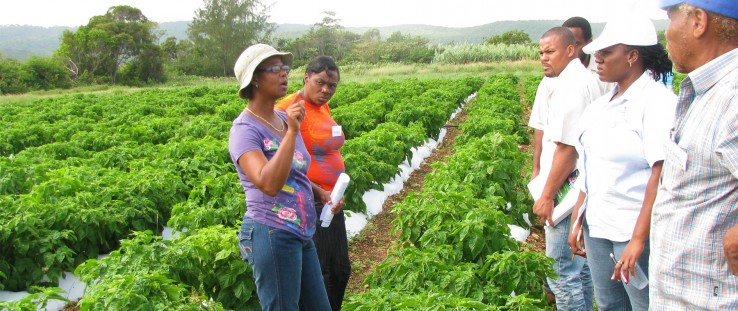 Farmer Cheryl Binns discusses her farming methods with other farmers and representatives from the Government of Jamaica.
JaREEACH
Farmer Cheryl Binns discusses her farming methods with other farmers and representatives from the Government of Jamaica.
JaREEACH
 Farmer Cheryl Binns discusses her farming methods with other farmers and representatives from the Government of Jamaica.
JaREEACH
Farmer Cheryl Binns discusses her farming methods with other farmers and representatives from the Government of Jamaica.
JaREEACH
It’s midday and the sun is scorching hot, with temperatures reaching over 90. But the heat is not a deterrent for Cheryl Binns, who is on her 12-acre farm picking scotch bonnet peppers.
Binns, a mother and grandmother, took up farming later in life. For the last seven years, she has been a farmer in the community of Braco Trelawny, Jamaica. “This is what I love and there is no looking back. I am a full-time farmer,” says the former auto parts saleswoman.
Binns wasn’t always so enthusiastic, especially when she first secured an acre of farmland through a private lease to begin her second career.
“I didn’t know anything about agriculture,” she said, admitting she was long on passion but short on experience. “I started off with onions, scallions and peppers, but in the beginning it was bumpy. The work that I put in did not yield the financial gains or personal satisfaction that I wanted. My agriculture skills were limited and the unpredictable weather did not help … I was losing.”
Binns is not alone. Thousands of farmers across Jamaica struggle to increase yields and improve crop production, hobbled by a lack of farming skill and failure to take into account the growing change in weather patterns caused by climate change.
Recognizing this continuing challenge among farmers, the Government of Jamaica, USAID and ACDI/VOCA teamed up in 2010 to develop an agriculture project, which in 2012 evolved into Jamaica Rural Economy and Ecosystems Adapting to Climate Change (JaREEACH). The primary goal: to protect rural lives, livelihoods and ecosystems in targeted Jamaican communities affected by climate change through interventions that drive adaptation and build resilience.
USAID partnered with the Ministry of Agriculture’s Rural Agriculture Development Authority to introduce climate-smart farmer field schools. This approach teaches farmers the practical skills they need to integrate resilience-building best practices that protect their livelihoods.
The farmers complete an extensive curriculum covering agro-ecosystem analysis, integrated pest management and climate change, and learn about water harvesting, conservation strategies, irrigation systems, drought resistant crops and ideal planting schedules that coincide with rainfall patterns. And farmers are testing their new knowledge and skills regularly.
“We have to get out into the fields and teach our farmers—we call this our school without walls,” says Dean Passard, technical adviser for JaREEACH. “Our farmers do not have the time to leave their fields and sit in a classroom, so we take the school to them in the fields.”
Passard is brutally honest with farmers and other Jamaicans. “The adoption of a climate-smart approach is essential as farmers increasingly face climate-driven hazards, which threaten the crops, food security and incomes of many rural households,” he says. “We needed to get this knowledge out so that, in the event of another hazard, the damage and losses would be less significant.”
Farmers vs. Pests
In the parish of St. Elizabeth, farmer Hicks Holness faced a major pest infestation that ate away at his crops and livelihood—the beet armyworm. Prior to attending the farmer field school in 2013, Holness said he battled the pests for years. “Eighty-five percent of my scallion and onion fields were damaged from this pest. I lost a lot of my income,” he said.
But today, Holness has reported tremendous success in combatting the beet armyworm due to the knowledge he gained from attending the farmer field school. By using the integrated pest management measures against the beet armyworm, Hicks now reaps 400 pounds of scallion from his field every six weeks compared to 25 pounds during the height of the infestation.
“I’m very happy that I have been able to get rid of the beet armyworm and return my own scallion field to a healthy state so that I can now reap the rewards of my labor. But I tell you, I am even happier that I have been able to share my knowledge with the other farmers in my community so that they can get rid of beet armyworm, too,” he said.
Malden Miller, an environmental specialist at USAID’s mission in Jamaica, said the field schools will help to maintain the sustainability of the country’s agriculture sector.
“A healthy and thriving agriculture sector depends on the resources, support and timely knowledge imparted to our famers. Farmers contribute to the welfare of society not only through producing valuable goods, but also by strengthening food security and the improvement in our livelihoods,” said Miller.
As a small developing state, Jamaica’s major economic sectors, including agriculture, are vulnerable to extreme weather patterns like drought and hurricanes. In 2012, the agriculture sector suffered major damage and loss amounting to almost $16 million from Hurricane Sandy, which was just a Category 1 storm when it hit Jamaica’s shores.
The country cannot escape or prevent these natural events from happening, but it can take the necessary measures to mitigate huge setbacks brought on by the impacts of climate change, Miller said.
Knowledge Brings Success
To date, approximately 3,000 farmers have been trained at farmer field schools and have seen significant improvements with their crop cycle. Farmers applying best practices such as drip irrigation, plastic mulch and water harvesting have increased their scotch bonnet pepper production by 30 percent.
“I must admit, at first I was hesitant to participate in the training,” says Binns, the grandmother with the super hot peppers in her field, “but I am glad I did. Within months of receiving the training, I saw an increase in my crop production.”
It’s an increase that would continue to grow as Binns grew more than 80,000 pounds of scotch bonnet peppers over a three-month crop cycle in 2011, breaking the country’s previous record of 30,000 pounds, earning her the title “Hot Pepper Queen.”
Since attending the farmer field school, Binns continues to successfully control and protect her crops from erratic weather patterns and pest invasion without extensive use of chemical insecticides. She has further expanded her crop production— which now includes callaloo, cucumber, eggplant, potatoes, yam, tomatoes and sweet pepper—and sells to local hotels and manufacturing companies.
This confirms that the former saleswoman made the right career change. “I wanted something that was more rewarding,” she said, “Something that I could look forward to doing every day as well as reaping the rewards.”








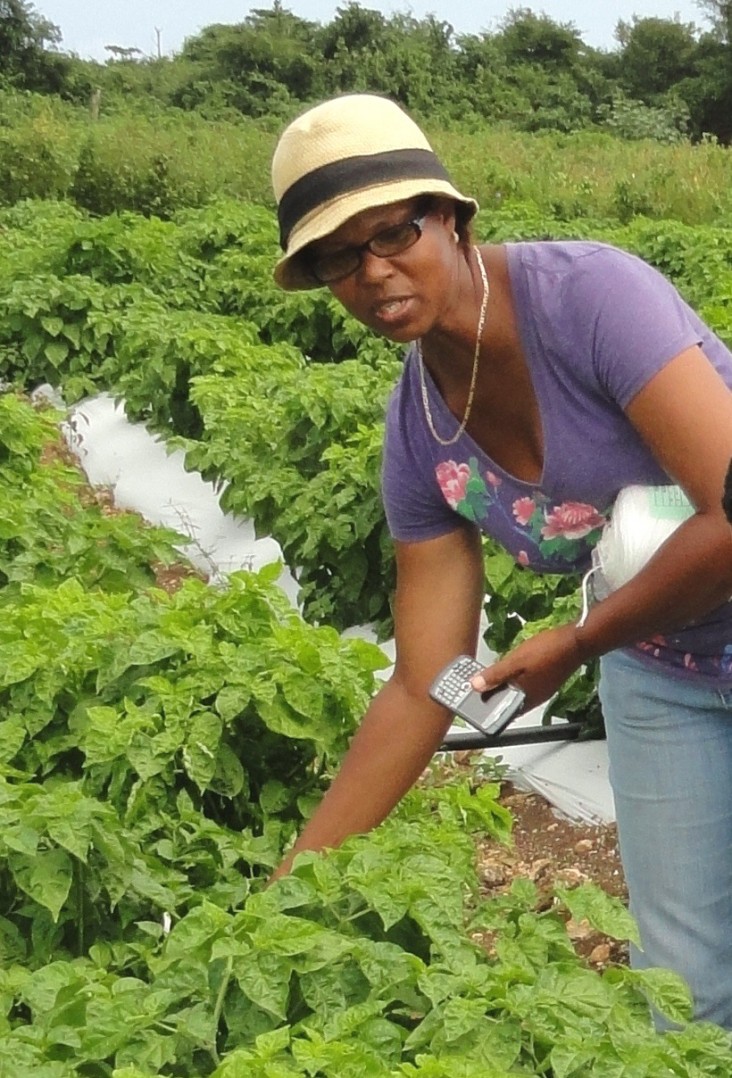
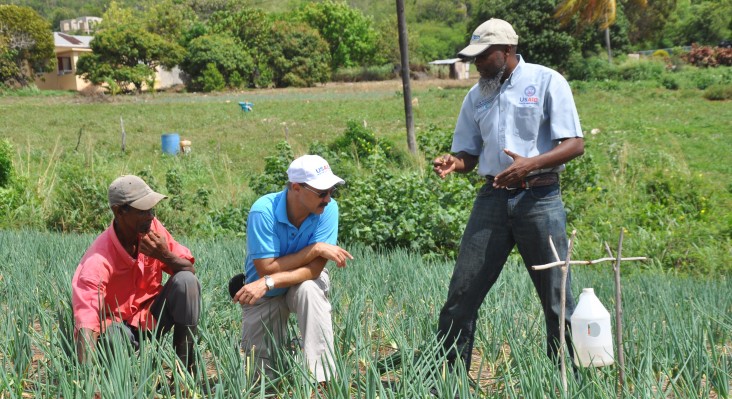
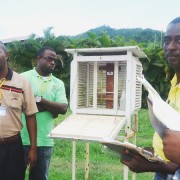
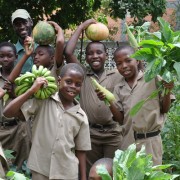

Comment
Make a general inquiry or suggest an improvement.